Digital transformation in horti: are people indispensable?
Added on 17 May 2023

How far can we go with automation?
Technology is evolving at an unprecedented rate, that's no secret. What does this mean for your organization now? What are the limits of automation? How does this affect your employees? My belief is that as human beings we are and will remain indispensable. We are the only ones capable of taking responsibility for our work, our families, our country, and our planet. It is not whether there is still room for us humans, but what place we have in this changing world.
Increasing productivity
Despite developments such as Chat-GPT and GPT-4, I do not believe that digital transformation will pose a direct threat to humans in the near future. As humans, it is also an opportunity to make a greater impact. Artificial intelligence provides insights we cannot generate ourselves, it can help us make better decisions at an earlier stage, and it can make us aware of the consequences of our choices. Digitalization actually gives us increasing responsibility while taking over more and more of our tasks. Paradoxical, isn't it?
Responsibility
Essentially, responsibility refers to what result is expected of you; you are responsible for delivering quality products, reducing costs, reducing your carbon footprint, etc. However, how you achieve this result is subject to change. Whenever new opportunities arise for improving results, it is our responsibility to take advantage of them. This must be used in some way!
Photo Courtesy of Mprise
More news















